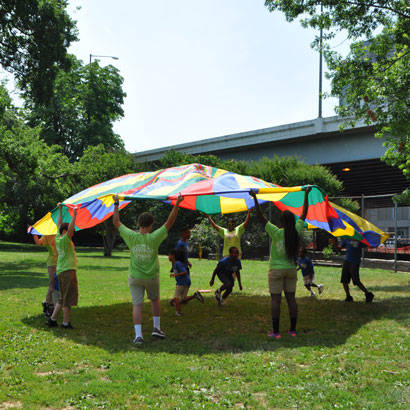
What do a day of play and a day of work on Capitol Hill have in common? For one day in June, they were one in the same.
On Thursday, June 29, congressional staffers were treated to a taste of a typical day in a park and recreation summer program as part of the National Recreation and Park Association’s (NRPA) Summer Camp on Capitol Hill. The event was designed to reinforce the fact that communities across the country rely on safe and quality out-of-school time programming offered through local parks and recreation, but these same communities also rely on the support of key federal funding streams like the 21st Century Community Learning Center program and the Summer Food Service Program.
To put words into action, NRPA invited Hill staff to experience what a child typically experiences in a summer camp or out-of-school time program offered by local parks and recreation. They were able to see firsthand how federal funding is critical to fostering healthier youth through out-of-school time.
Keith A. Anderson, director of the District of Columbia Department of Parks and Recreation (DPR), said he hoped the event showed the community what parks and recreation has to offer.
“DPR offers meaningful activities to keep kids active and prevent learning loss in the summer, and I hope Congress sees that we support what’s most important in America, and that’s our children,” Anderson says. He adds that park and recreation programming is the great equalizer for kids: “No matter the background, kids are all equal when playing.”
NRPA and DPR were joined by Prince George’s County Department of Parks and Recreation, Caroline County (Maryland) Recreation and Parks, and the Maryland-National Capital Park Police for out-of-school time summer-program activities and for a typical program lunch offered through the federal summer meals program.
The local agencies brought mobile units to the event and showcased examples of their activities, like soccer, yoga, arts and crafts, and youth empowerment programs.
Prince George’s County Department of Parks and Recreation Arts on a Roll mobile arts service was on-site leading some typical craft projects it brings to parks. Jesse Kirkland, Arts on a Roll coordinator, says the mobile unit is beneficial because “sometimes it’s important to go where people are. Parks have had arts programs for years, but if we can get to people who don’t typically have access to parks and show them what’s available, it’s more likely they’ll come to our facilities when they have the chance,” Kirkland adds.
Caroline County Recreation and Parks showcased to decision makers the skills gained through park and recreation programming through its counselor in training (CIT) program. The agency brought a dozen of its trainees, all in their early teens, to the event to run its booth and activities. The trainees all agreed that programming in parks is important because it helps kids gain social and leadership skills, as well as a shared sense of responsibility. And, the one thing they wanted decision makers to know was that parks and recreation means more than summer camp — it’s a way to engage kids and families through experience and opportunities.
Desiree Hoffman, associate director in the government of the District of Columbia’s executive office of the mayor and office of federal and regional affairs, felt it was important to attend the event so she and other decision makers could see how the funding of out-of-school time programs helps residents and kids. “Communities thrive when kids are supported and have access to quality programs,” she says. “With park programming, they learn and have fun at the same time, and that keeps them sharp.”
Revolution Foods, which provided lunch for the event attendees, showcased a typical summer program meal. The company’s Human Resource Coordinator, Alysha Groghan, says its program meals far exceed the health requirement guidelines. “We use wholesome ingredients, low sodium and whole grains to get healthy meals to kids who may not get a balanced meal,” she explains.
Leading up to the event, NRPA co-sponsored a briefing with the National Summer Learning Association, followed by Hill visits. The Summer Camp also kicked off July as Park and Recreation Month, a month that officially celebrates the importance of play and how much can be discovered at local park and rec facilities.
Co-sponsors for the event included the Afterschool Alliance, After-School All-Stars, the Food Research and Action Center, the National Afterschool Association and the National Summer Learning Association.
Maureen Acquino is the Assistant Editor for Parks & Recreation magazine.

